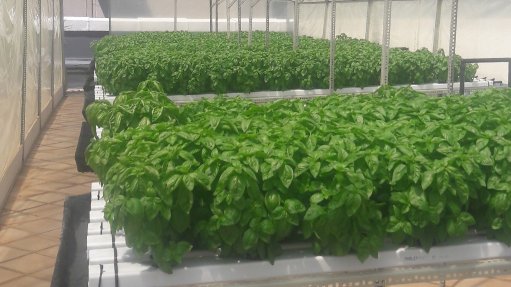
The Chamber of Mines is participating in and has funded a pilot project to assess the feasibility of growing herbs and vegetables on the rooftops
Photo by: Chamber of Mines
JOHANNESBURG (miningweekly.com) – The Chamber of Mines (CoM) on Wednesday hosted the launch of the Urban Agriculture Initiative, which is aimed at creating a vibrant urban agricultural ecosystem by “innovatively” repurposing disused rooftops and making use of hydroponics and aquaponics to produce agricultural produce for Johannesburg’s inner city communities.
The initiative was established by the Johannesburg Inner City Partnership (JICP).
As a key stakeholder in the JICP, the CoM is participating in and has funded a pilot project to assess the feasibility of growing herbs and vegetables on the rooftops of inner city buildings including on and near its offices.
The first crop was planted on the rooftop of the CoM’s building for the benefit of an agricultural entrepreneur or agripreneur.
The CoM states that if the pilot project is successful, it will be rolled out to other sites, which will assist in ensuring sustainable employment for other agripreneurs.
“Although still in its early days, a successful basil crop has been harvested and sold,” the chamber highlights.
Moreover, the CoM notes that Johannesburg is one of many cities worldwide turning to inner city farming with the objective of addressing high unemployment and food insecurity, while simultaneously aiming to regenerate neighbourhoods.
“A sustainable project of this nature has the potential to provide inner city communities with access to cost-effective and healthy food while providing gainful employment to urban agripreneurs.”
The use of hydroponics and aquaponics means that crops will be grown in special water solutions without the need for soil or large open spaces. In fact, only a very small area is required to produce a sustainable crop.
The chamber elaborates that this approach also significantly reduces water consumption, with 95% of the water being circulated and reused.
Production can be increased by extending the gardens upward, and soil erosion and pest control issues are completely eliminated. The CoM adds that hydroponic plants also mature faster than crops in other mediums, resulting in a faster turnaround.
“The chamber hopes this project will provide a useful impetus to this new take on urban agriculture and will extend beyond rooftops to sidewalks and even to other underused spaces for the benefit of the people of Johannesburg’s inner city and beyond,” the CoM states.